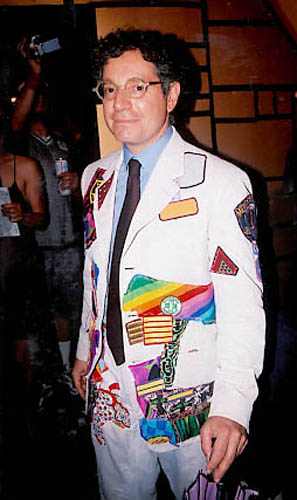Another day, another story about the sad situation at the Museum of Contemporary Art in Los Angeles — that’s the way it’s been going. So any hopes by “philanthropist” Eli Broad and his hand-picked director Jeffrey Deitch that the brouhaha over the firing/forced resignation of chief curator Paul Schimmel is going to blow over should now seem like wishful thinking.
 That little dismissal, which no doubt was the culmination of long battles within the museum, is going to cost MOCA, short-term and probably long-term.
That little dismissal, which no doubt was the culmination of long battles within the museum, is going to cost MOCA, short-term and probably long-term.
Deitch broke his silence, which as I’ve said before has shown him to be either a coward or a puppet, on Friday, giving a “wide-ranging interview” to the Los Angeles Times. I don’t know how long it went on, but — through I would bet no fault of the writer, Reed Johnson, Deitch managed to say almost nothing substantive. (He probably signed a nondisparagement agreement, as Schimmel assuredly did.) Sample:
Eli has been an absolutely great patron with us. He’s so totally supportive.I know that there’s this conspiracy theory. It doesn’t make any sense. That’s not the case.
Deitch also managed to say nothing in his own blog post. Sample:
We would like to reassure you of our commitment to extending MOCA’s legacy and international reputation as a preeminent contemporary art institution, to fulfilling the museum’s mission, and to ensuring that it has a secure future both financially and artistically.
And just why should anyone believe that reassurance? He doesn’t say.
Yesterday’s Guardian, in the U.K., published “LA aesthetes fight pop-art billionaire,” which provided a recap of the last few weeks, but, in my opinion, got a few things wrong. It mentions accusations that Deitch is dumbing down and says:
And behind that, many suspect, is a billionaire whose motives are not entirely clear. While Broad saved Moca and wants to keep it viable, he is also constructing a rival museum across Wilshire Boulevard [sic] to house his own collection.
Aside from that location gaffe, I think we know exactly what Broad’s motivations are: he wants larger attendance at MOCA and at his own museum, when it opens. That goal happens to coincide with Deitch’s ambition, which has often been more about being the center of attention as a creator of events, aka parties, than it has been about art. The Guardian story hits that point tangentially:
LA art critic Mat Gleason said: “Deitch is actually inoculating the museum from conflicts of interest with high-wealth collectors.” By putting on more pop-culture orientated shows, “he can go to low-level donors and say, ‘We throw really cool parties, why don’t you donate to us?’ “
And when the story says
Friends of Deitch say he’s tired of being criticised for placing pop art or shows about disco culture ahead of cutting-edge art. But they also say he’s perfect for Los Angeles because it is a city “wrapped up in celebrities and celebutantes”.
It’s the artists, then, who may have to accept that they live in an entertainment town. “But, of course, they’re freaked out that people like James Franco are getting exhibitions because it’s not serious and it doesn’t matter,” says a Moca supporter.
…I was surprised. I had thought, at least, that Pacific Standard Time showed that the art produced in southern California, at least between 1945 and 1980, was not “entertainment.” Â
